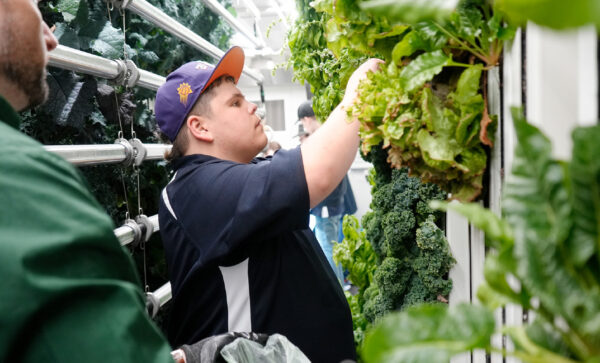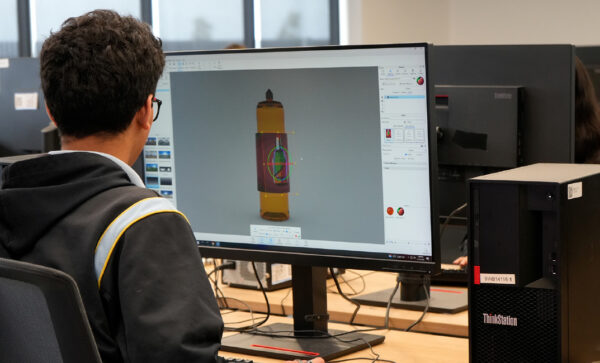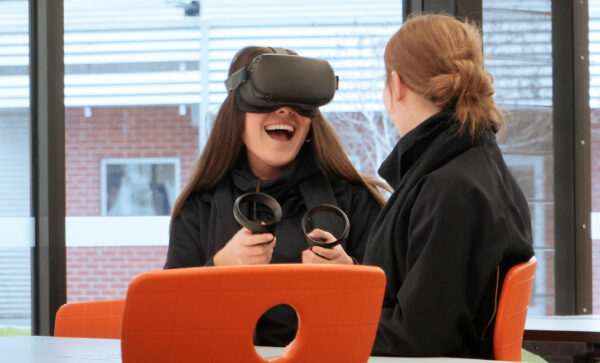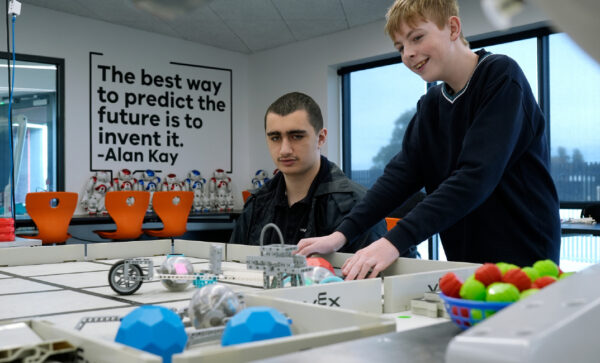Since 2018 when Wyndham Tech School first opened its doors, it has had a very clear brief: don’t do business as usual.
“What we’ve been asked to do is to disrupt traditional curriculum and teaching methods,” says Sam Nikolsky, the school’s director. “Secondary schools have got a real challenge with student engagement and with creating visible pathways to high tech careers. That’s what we can help with.”

Wyndham Tech School is a designated science, technology, engineering and maths (STEM) centre of excellence that all secondary schools in the Hobsons Bay and Wyndham City council areas can access at no cost. It is currently the only such complex operating in Melbourne’s west. Under one roof is housed the latest technologies, AI applications and expertise found in the modern workplace. It brings a research lens to these resources to trial and test education programs that can be scaled in schools.
“We can give schools what works and what has impact,” says Sam. “Because we have the time they don’t have to trial, fail often and learn.”

Nor do schools in the West necessarily have the financial resources and, in some cases, even the qualified teaching staff, to deliver STEM subjects in the coordinated, integrated and enriching way Sam and his team can. That they can is due to Department of Education and Victoria University funding, and the close, productive ties the school enjoys with local and international industries and professional bodies.
However, that doesn’t mean Wyndham Tech School sees itself as the servant of commerce. “We’re about students as creative users of technology coming up with solutions to real challenges,” Sam explains. “But we do want to draw a line between education and learning outcomes and the jobs of the future.”
The industries Wyndham Tech School collaborate with are those driving the modern Australian economy, and have skills shortages in fields like cyber security, engineering and renewables.

“We’re here to give our young people in the West the very best opportunity to get those jobs, many of them local, and work with these big organisations with big resources, otherwise they will go somewhere else,” says Sam. “If students spend their school time not learning what they need for the workplace, then we’re not doing our job. The skills and knowledge needed in the workplace are changing quicker than curriculum and schools. And that’s why education needs to be disrupted a bit.”
In the process of doing that, Wyndham Tech School isn’t ignoring the personal and social development needs of young people. It is the other side of the coin when it comes to educating well rounded, resilient and employable individuals.

“We’ve spoken to industry and professionals,” says Sam. “The themes that bubble to the top again and again are: can students communicate and tell their story, advocate for their ideas? Can they work in a hybrid capacity, that is, with people online and physically in the same room? Can they bring people together and use their social skills to problem solve? And importantly, can they bring a willingness to learn? These might be called soft-skills but they are crucial because workers are increasingly being asked to do more than bring their technical skills to the workplace.”
And so, for Sam and his team, firing up student curiosity and enthusiasm for learning is front and centre at Wyndham Tech School. “We design our spaces to reflect our principles of student led collaborative learning. Projects that give students particular roles and responsibilities but delivered within a collaborative environment. For example, last year we had 25 students in here from Truganina Secondary collaborating with 25 students in Hanoi to develop online a virtual 3D video game. Technology facilitated that collaboration and the learning.”
And they haven’t forgotten about the three Rs.
Technology and AI applications are used as the point of entry into a range of traditional academic subjects. Wyndham Tech School helps schools develop cross-curricula programs that integrate technology with mainstream subjects such as English (podcasting and storytelling), Geography (urban planning and how cities work), Science (climate change and sustainability) and Maths (systems engineering and applied computation).
“Schools can be very siloed in how they approach content,” says Sam. “But in the real world they are all so incredibly blended. So how do we use data across the curriculum? It’s everywhere and comes in different forms. We can gamify it and show for example where trains are in the network, what pedestrian and car traffic is doing in Watton St, Werribee. Where are the tagged seals at Phillip Island right now? There is real live data of how the world is working that sits across History, Maths, English, Geography and Politics.”
With 42 schools in its catchment, Wyndham Tech School knows that teachers and school leaders are critical to the success of their vision. To this end they not only provide on-site and online professional development programs for STEM and other subject teachers but, with Victoria University, have developed technology units for first year student teachers.
On the day The Westsider visited Wyndham Tech School, a group of year 10 students from nearby Bemin Secondary College were working on game development as part of a school elective unit. The students initially seemed hesitant, but soon realised the possibilities that await when you don’t need to fear failure and every idea can be a springboard to something better. As the class progressed their engagement became palpable. Each week during term one they’ll return, be shown a new aspect of game theory, follow industry best practice and develop their own game prototypes.
Meanwhile across the way, a group of expert teachers and principals in residence with the Victorian Academy of Teaching and Leadership were hunkering down for a full day of workshops. It is the Wyndham Tech School hybrid learning model that Anam Javed, manager of learning at the Academy, hopes these professionals will take back to their schools to give things a good shake up.
In a sense, Wyndham Tech School resembles the old tech schools of yesteryear that prepared young people for a life in the trades. However, the tools, the skills, the problems to solve and the ways to solve them have changed almost beyond recognition. “Today it’s being done through programs, systems engineering, applied computation,” says Sam. “That’s now how it looks. And it’ll keep changing.”
In other words, for schools in the West, it can never be business as usual.

